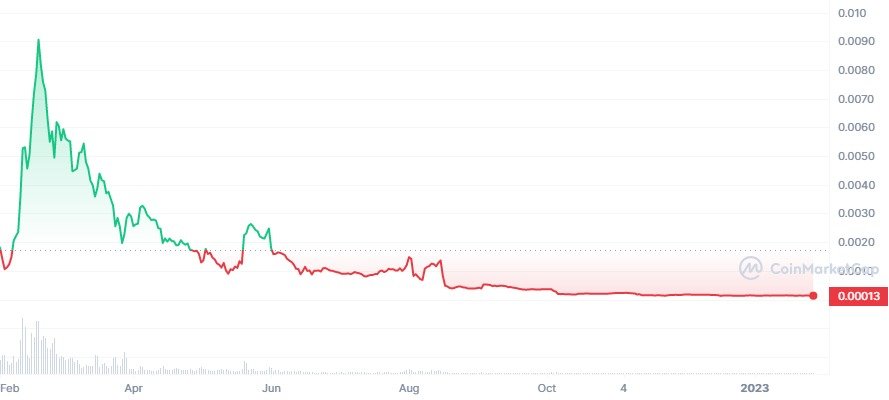As the global crypto market breaks through the $1 trillion mark for the first time since the collapse of FXT, we ask what is next for the global crypto marketplace.
Backdrop
Despite a dismal performance in 2022, with a huge market contraction in the crypto market that culminated in the collapse of FXT, crypto has started 2023 with a bang. Bitcoin the market leading crypto is up by 40% in January and the result is the global crypto market is now worth more than $1 trillion dollars.
Crypto market capitalization had slid to a low of about $745 billion in November. This was due to the collapse of FTX. In contrast, a year earlier, crypto momentarily topped $3 trillion at the height of the digital-asset frenzy in late 2021.
Fundamentals
The latest crypto rally demonstrates renewed investor optimism across riskier assets including stocks, as cooling US inflation improves market sentiment across the pond. Hopefully, the end is in sight to the Federal Reserve’s most aggressive cycle of interest-rate increases since the 1980s. This will have a positive impact on UK investors’ sentiment that the Bank of England will follow suit.
Recent news that FTX has recovered more than $5 billion in assets to repay creditors also lent some support.
Technical Analysis
For traders, who look into technical analysis, the $1 trillion dollar mark is seen as a huge psychological barrier. When the market is below this level, it acts as a huge resistance level. When crypto trades above this level, it can act as a massive support level, acting as a marker of positive things to come.
What is technical analysis?
Simply put, technical analysis is the art of spotting patterns in market behaviour. Unlike fundamental analysis that looks at economic data, technical analysis shows nothing more than sentiment. As traders are often looking for the same patterns, technical analysis can drive a market when there is an absence of major fundamental news such as inflation, or employment figures. The breaking of the $1 trillion mark could signal a rapid ascent for the crypto market for 2023.
Volatility
The majority of crypto coins or tokens are very volatile by nature. They tend to experience very wide swings in its value. This variance in its peaks and troughs are typically far more pronounced compared to equities. There are a number of key reasons for this. We outline the key reasons below:
Speculation
Although cryptocurrency is often described as an alternative to fiat currency, the reality is that it is often difficult to pay for goods and services through them. Then, even when the larger coins are accepted there are frequently large transaction costs. As a result, buyers of crypto tend to be speculators anticipating that in the long term, the crypto they are buying will appreciate considerably in value.
Not asset backed
Unlike buying property or shares, crypto has no real world assets underpinning its value. Taking Bitcoin as an example, the coin offers no income just scarcity. As a maximum of 21 million Bitcoin can be in circulation its scarcity is what up its value.
In contrast, owning property or shares is likely to generate an income in the form of rent on property or dividends with shares. As a result, both are seen as a lower risk proposition by most investors. Consequently, there is less volatility.
Traders
Traders speculate on the market to gain returns. This can be on shares, commodities or crypto. Many traders use leverage to increase potential returns. More recently, many institutional trades have been borrowing money to increase their position in cryptocurrency. Whilst this can be a good strategy if the market goes against you, your losses are multiplied. As a result, when the underlying crypto goes down in value they are forced to sell. The result is increased volatility in the market.
Manipulation
Larger coins such as Bitcoin and Ethereum are widely recognised with larger trading volumes, and with diversified number of holders. Unfortunately, for the majority of crypto or tokens, this isn’t the case. Most of the smaller coins or tokens are held by the company founders with only a few in circulation. This can often result in huge market manipulation.
How does this work?
Let’s say for example that a token has most of its holding with the directors or developers who created the project, they can in effect control the price. All they have to do is get a computer program to buy and sell a number of tokens continuously and they can then walk up the price. As the price trades all massive multiples they can then sell their holdings to investors at these inflated prices.

The chart above shows the trading price of the Luck block token. As the token listed it rose significantly. This is likely due to a sound trading strategy combined with strategic news releases through the media. As most tokens were kept by a few participants they could drive the price up. Then when larger sales are made the token begins a downward descent.
Evolution
As crypto matures it will become better regulated and then adopted into the mainstream. Part of this evolution will see an influx of money from institutional investors. Whilst this has happened to some degree already it is likely to become far more prominent.
Historically regulation was a big obstacle. Many fund managers shied away from crypto due to a lack of understanding with many market players viewing it as nothing more than a Ponzi scheme.
Yet despite the collapse of FXT which is being anticipated as fraudulent, many bigger institutions are looking at entering the market.
There are two reasons for this:
- Regulation. Firstly, better regulation offers investors better protection and cuts down on illegal funds using crypto to clean or hide dirty money.
- Understanding blockchain. Banks and financial institutions are finally understanding the benefits that blockchain can provide. This has already resulted in them using it to improve auditing and compliance. This is a necessary step towards full scale usage.
Regulation
Below we look at regulation of global crypto market is changing.
Regulation in Gibraltar
Last year we reported that The Gibraltar Financial Services Commission had granted permission for Valereum to buy the Gibraltar Stock Exchange. Valereum is a blockchain company. It is expected that this will become a fully regulated token exchange. This is a big deal as it can be the catalyst to promote tokens to the mainstream.
Regulation in Hong Kong
Hong Kong is looking at opening up crypto investments to retail investors. This goes against Chinese policy which bans this type of asset class for retail investors “We want to make our policy stance clear to the global market to demonstrate our determination to explore fintech with the global virtual asset community,” Financial Secretary Paul Chan told the Hong Kong Fintech Week conference.
Regulation in Singapore
Singapore already offers regulation and access to Crypto investments. Crypto.com is based in Singapore due to the credibility of digit assets in that Jurisdiction. Recently the Monetary Authority of Singapore (MAS) published two consultation papers proposing regulatory measures to reduce the risk of consumer harm from cryptocurrency trading and to support the development of Stablecoins as a credible medium of exchange in the digital asset ecosystem. These measures will be part of the Payment Services Act. Stablecoins are pegged to an underlying currency. This makes them a viable substitute for currency.
Regulation in Dubai
Dubai already holds significant legislation in crypto assets. This regulation which is overseen by the Dubai Financial Services Authority has recently been increased. It covers not only AML/CFT risks in respect of trading, clearing, holding or transferring Crypto Tokens but also addresses risks relating to consumer protection, market integrity, custody and financial resources for service providers.
Regulation in the UK
In the UK, several exchanges are registered with the FCA. However, currently investing in these crypto exchanges is excluded from its statutory protection.
Understanding Blockchain
The internet has had a profound impact on our everyday lives. Yet when it was first invented most people didn’t bat an eyelid as they couldn’t visualise its benefits. By the turn of the millennium this changed and not it is a crucial part of our everyday lives.
Immutable nature
People are now only beginning to understand the potential that blockchain technology offers. One of the key advantages is its immutable nature. This can help validate entries and prevent tampering. This offers considerable advantages for compliance and auditing. Back in 2016, Santander recognised that the technology could save banking infrastructure between $15-20 billion per annum. Fast forward to today and most banks are using the technology.
Reduces fraud
The same technology is saving the food industry billions by preventing fraud and streamlining supply chains. The same technology would save American and UK taxpayers billions by increasing transparency in funding and reducing misappropriation of funds.
Facilitates tokenization
We have reported previously how blockchain technology will transform the real estate market. In the future, we are likely to see home log books similar to cars where all information about any property will be uploaded on the blockchain. This will dramatically reduce the time it takes to buy a property, as well as cut down costs to third-party professionals such as solicitors and mortgage brokers. Just as importantly, real estate is becoming increasingly tokenized. This opens up ways of investing in real estate and it will stimulate the world property market by making investing more accessible to all.
The future of the global crypto market
We are already seeing a surge in tokenized real estate projects as the industry matures. This offers investors pro rata ownership of real estate. For commercial property, it will provide much needed liquidity and result in higher selling prices. Whilst for crypto investors, can now invest in projects that are asset backed.
Tokenization isn’t just restricted to property. There are tokenization projects for several different types of projects. Alternative energy is one market which is rapidly increasing. This is due to the high price offered for energy in the current economic climate.
At Esper Wealth see the potential that crypto can offer. Within the next decade, there will be several companies which will opt to list on a crypto exchange instead of a stock exchange. This is due to:
- Cheaper listing costs
- Better liquidity due to crypto markets being open 24/7
- A better tax environment
- Global reach for investors
Due to these advantages, we have set up a separate company called Esper Developments. Esper Developments offers tokenization with a difference. Instead of having pro-rata ownership of a property or a development, you have pro-rata ownership of the underlying company. This means you can invest in property development where there is potentially a far higher percentage return on your capital.
